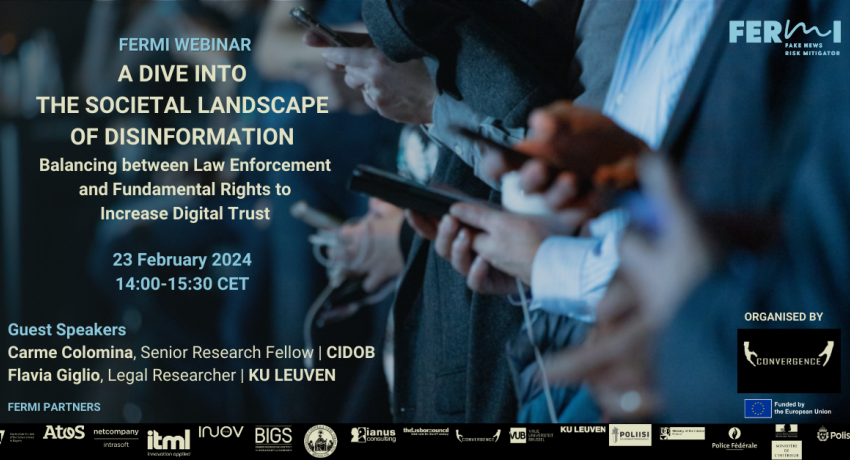FERMI Webinar: A dive into the societal landscape of disinformation - Balancing between Law Enforcement and Fundamental Rights to Increase Digital Trust-
Organised by Convergence in the context of the EU-funded research project FERMI
Audience: General Public
Date: 23/02/2024 at 14:00 - 15:30 CET
Guest Speakers:
- Carme Colomina is a Senior Research Fellow specialized in European Union, disinformation and global politics at CIDOB, Barcelona Centre for International Affairs, as well as visiting professor at the College of Europe, in Bruges. Her research examines how technology impacts EU democracy, politics and civic engagement, with a special focus on the societal impact of disinformation but also of the legislation to fight against it. She also co-authored a study for the European Parliament about “The impact of disinformation on electoral processes and human rights in the world”.
- Flavia Giglio is a legal researcher and holds a cum laude Master's degree in European and Transnational Comparative Law from the University of Trento. She currently works in the cybersecurity & cybercrime cluster of the KU Leuven Center for IT & IP Law (CiTiP). She is also an affiliated Research Fellow with the Information Society Law Center (ISLC) of the University of Milan (Italy). During her time at CiTiP, she worked on a number of national and European projects covering various aspects of the intersection between technology and the law. However, her main research interests revolve around the intersection between criminal law and media law, with a particular focus on the interplay of public and private authorities in the moderation of illegal and/or harmful online content. Privacy and data protection law is also one of her fields of expertise, in relation to both social media governance and the activities of law enforcement authorities in criminal matters.
On 23/02/2024 Convergence, as the assigned SSH expert of EU-funded project FERMI, organised and hosted a webinar entitled: “A dive into the societal landscape of disinformation - Balancing between Law Enforcement and Fundamental Rights to Increase Digital Trust-“.
The FERMI webinar offered an insightful exploration into the complexities of disinformation, highlighting the multifaceted nature of the challenges and its profound impacts on society. We deep dived into the complex interplay between security measures and the preservation of civil liberties. Our guest speakers described the intricate interplay of enforcing laws against disinformation while upholding the fundamental rights that underpin democratic societies.
Experts analysed the intricacies of defining disinformation within the EU framework, highlighting the absence of consensus among member states and the diverse tactics employed to distort information. Discussions emphasised the critical role of digitalisation in transforming the media landscape, advocating for a comprehensive societal approach to enhance media literacy and resilience against disinformation. Quest speakers illustrated the need for reevaluating concepts of trust and reliability in information consumption, suggesting a nuanced understanding of disinformation's broader societal implications and the imperative for collaborative efforts to safeguard democratic processes and societal well-being.
Key Highlights:
Defining Disinformation: The speakers underscored the lack of a universal definition of disinformation within the EU, emphasising the intricate challenge of distinguishing between misinformation, disinformation, and malinformation.
Digital Transformation's Impact: The digital era's disruption of traditional media dynamics was a focal point, with discussions on how algorithmic intermediation has reshaped the public discourse and information consumption.
Journalism: The precarious state of journalism, exacerbated by digitalisation and economic pressures, was highlighted, alongside the critical need for media literacy and robust journalism to combat disinformation.
Societal Implications: Discussing disinformation's broader societal effects, including the erosion of trust and the potential for digital tools to both spread and combat false narratives.
Emphasis on Collaboration: Particularly noteworthy was the emphasis on collaborative efforts between public and private sectors to safeguard democratic processes without infringing on fundamental rights.
During the webinar a plethora of challenges were discussed but also sparked conversations about potential solutions. The need for media literacy and critical thinking skills was a recurrent theme, emphasising education as a cornerstone for building a discerning and informed digital citizenry.
Interactive Q&A:
The dynamic Q&A session allowed participants to engage directly with our guest speakers, posing thought-provoking questions that ranged from the technical nuances of AI in detecting disinformation to the ethical considerations of censorship. This interaction enriched the webinar, offering personalised insights and emphasising the collective responsibility to safeguard digital dialogue.
Reflections:
Survey results gathered before and after the webinar painted a promising picture: participants' understanding of disinformation and digital trust issues saw marked improvement. This leap in comprehension is a testament to the quality of discourse and the expertise shared during the webinar.
The FERMI webinar presented a compelling narrative on the challenges and opportunities presented by disinformation. It called for a holistic approach, recognising the critical role of education, legal frameworks, and ethical considerations in fostering a resilient information ecosystem. The depth of expertise among the speakers, coupled with their commitment to a fact-based public discourse, provided participants with a comprehensive understanding of disinformation's multifaceted impact on society.
As we navigate the complexities of the digital age, the insights from the FERMI webinar underscore the importance of collaborative efforts to uphold the integrity of information. It's clear that building digital trust and combating disinformation requires a concerted effort from all sectors of society. The path to overcoming disinformation lies in our collective efforts to educate, legislate, and collaborate. These insights reaffirm the necessity and significance of the FERMI project.


